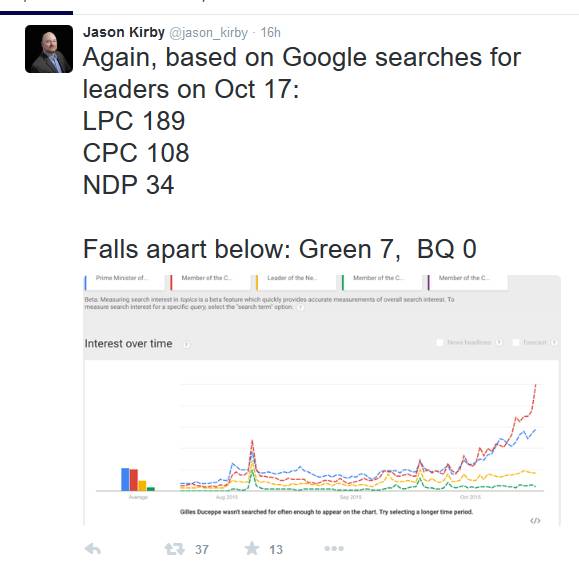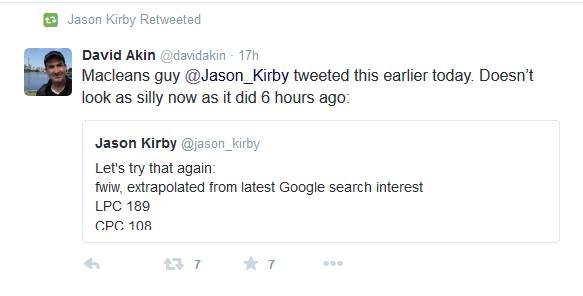

Yesterday, when most everyone was predicting a tight race in the Canadian election, Maclean’s writer Jason Kirby examined search data in Google Trends and came up with a different prediction: the Liberal party would sweep to a majority.
Based on the returns Google provided for these search terms, Kirby predicted the Liberals would win 189 seats, compared to 108 for the Conservatives and 34 for the NDP. Kirby’s result was much more accurate than any other source. A seat projection based on up-to-date polls posted in the Huffington Post (Election 2015 Seat Projections: Trudeau The Favourite, But Nothing Guaranteed (ANALYSIS) predicted 133 seats for the Liberals, 120 seats for the Conservatives, and 76 seats for the NDP.
Writer Bryan Breguet said the chances in The Huffington Post piece were calculated based on 20,000 simulations that take into account the uncertainty of polls, the electoral system and the distribution of the vote.
A Globe and Mail election simulator had the Liberals at 145 seats, the Conservatives at 128, and the NDP at 37.

“With a margin of 17 seats, The Liberal Party win the election and will attempt to form a minority government,” said the Globe and Mail’s breakdown of the results. “Support for The Liberal Party is particularly strong in Manitoba where they take all but 6 of the seats. The Conservative Party will likely form the official opposition.”
The Liberals ultimately achieved their majority by winning 184 seats, compared to just 99 for the Conservatives and 44 for the NDP.
Writing on October 16th about a Google blog post that examined search habits of Canadians around the election, but offered no seat projection, Kirby publicly mused about the methodology of using internet searches as an election prediction tool.
“The question of whether Internet searches can predict election outcomes is one of great debate, for obvious reasons,” he said. “Big Data, the term given to the vast quantity of information now available, thanks to our hyper-connected lives, has shown to be highly useful in discerning consumer habits and trends. The possibility exists that data generated through the social web could be far more indicative of our voting inclination than what we tell pollsters we intend to do. Given the many high-profile failures by pollsters in recent elections, this would be an important tool for election forecasting.”
Noting a 2014 study by Oxford Internet Institute that cast doubt on the power of using internet searches as a predictor in elections, Kirby pointed out that while big data did show a correlation in recent elections in U.K., Germany and Iran, the results may have been skewed by selection bias.

“It will still be some time before researchers are ready to declare Google an election-predicting winner,” he said.
Justin Trudeau, who will turn 44 on Christmas Day, will become Canada’s second youngest Prime Minister ever. Conservative Joe Clark took office on June 4, 1979 at the age of 39 years, 364 days. Trudeau’s father, Pierre Elliot, was 48 years 185 days when he first took office on April 20, 1968.
News of Trudeau’s election win was greeted with surprise from the international press, with the New York Times calling it a “stunning rout” and the U.K.-based Guardian describing it as a “dramatic victory”.
Leave a Reply
You must be logged in to post a comment.



 Share
Share Tweet
Tweet Share
Share




Comment